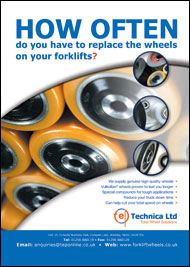 When people think about forklift wheels, the first thing that comes to mind is rubber tyres, but with the growing number of electric powered forklifts operating in UK warehouses, most will be running on various types of elastomer. Vulkollan® and Polyurethane are the two most common types of tread material used, and they can be modified to help forklifts operate effectively and safely, even in the most difficult warehouse environments.
When people think about forklift wheels, the first thing that comes to mind is rubber tyres, but with the growing number of electric powered forklifts operating in UK warehouses, most will be running on various types of elastomer. Vulkollan® and Polyurethane are the two most common types of tread material used, and they can be modified to help forklifts operate effectively and safely, even in the most difficult warehouse environments.
Vulkollan® sold under license by Bayer AG, is a polyurethane elastomer which has many useful characteristics that makes it ideal for forklift wheels. Excellent elasticity helps it maintain its shape even when trucks have been left standing overnight. It has good chemical resistance and can operate in temperatures down to -40ºC. It is difficult to tear or damage from sudden impacts and its surface is non-marking making it an excellent choice for operating inside your warehouse. It is recommended for intensive industrial applications that require high load capacity, good rebound resilience, speed and durability. Vulkollan® is typically more expensive than other elastomers, but with rising costs of frequently replacing wheels, it is often seen as a cost effective choice. There are many varieties of Vulkollan® that possess extra characteristics specifically for certain warehouse applications. Vulkollan® is used in almost every industry sector and is the preferred choice by most forklift manufacturers.
Vulkollan® can be produced to different levels of hardness. Lower hardness can be used to offer protection to tiled floors and provide better traction. Higher shore hardness will help where your forklifts are operating in very intense applications carrying particularly heavy loads at greater speeds. Hard compounds are also more resilient to flat spots as they quickly recover their shape.
For applications where you require better traction special granules can be added to Vulkollan® which improves acceleration, reduces slip and increases the braking effect. These “wet grip” wheels are very useful in applications where the floor is often slippery. You can have a wet grip wheel with a lower shore hardness which will further improve traction as more of the tread is in contact with the floor. These wheels are used in the fish, meat and dairy industries.
Top tip: If you find your drive wheels are cracking at the edges of the tread, this may be due to your forklift operating on very smooth surfaces while carrying heavy loads. A good solution firstly, is to buy the same wheel but in Vulkollan® with a crowned tread. This places more of the load on the centre of the wheel rather than its edges and should increase its lifespan. Secondly, by increasing the hardness of the tread you also raise the wheels load capacity, we recommend 95 Shore A or higher to be most effective.
Carbon fibres can be added during the manufacturing process to create an electrically conductive Vulkollan® wheel which is used in environments where there is a high risk of fire or explosion due to compressed air or extremely enriched dust. The carbon fibre method ensures that electrical discharge takes place over the entire contact surface and consequently is effective regardless of tread wear. Make sure that you get some form of certification with your wheel. According to European standards DIN 12527 the volume resistance value may not exceed 104 ohms. These wheels are used in the chemical, cosmetic, pharmaceutical and pyrotechnic industries.
Polyurethane is an elastomer similar to Vulkollan®, and sharing many of its beneficial attributes including good load capacity, wear, tear and chemical resistance as well as being non-marking. Its load and wear capabilities are many times that of rubber, and you will generally find polyurethane wheels on small electrical and manual powered forklifts operating in less intensive applications. Again you can also increase or decrease the hardness of polyurethane to suit your application. You can improve traction with soft wet grip compounds which offer excellent ride and safety qualities especially for smaller stand-on or sit-on low level pallet trucks.
If you have a problem with a particular application it is worth speaking to your wheel provider to see if there are better alternatives. A more appropriate tread material will not only make your wheels last longer but also improve the safety of your warehouse and at the same time reduce your operating costs.
This article was written by Simon Downs at TEP Technica Ltd. For more information: 01256 880119.




Comments are closed.